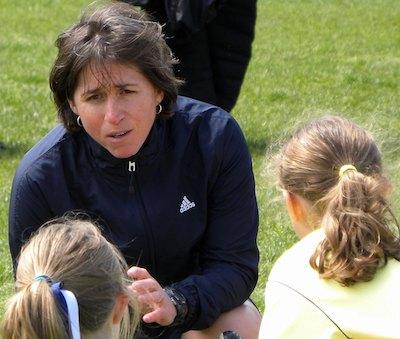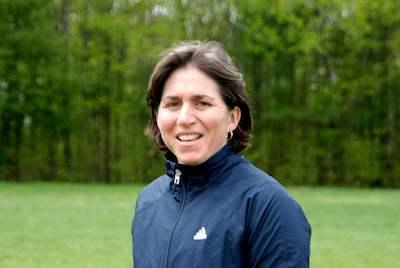Dr. Gentile on Dealing with the Pressure in Youth Competitive Soccer
By: Dr. Dina Gentile

Dr. Dina Gentile on the field coaching her team
Small-Sided Games: Preparing Players for Success @ U13’s National Level Competition
Dr. Dina Gentile helps our players prepare for mental strenth and success as she educates us parents.
US Youth Soccer decision to add the U13’s to the National Championships is the right direction for soccer in this country. There will always be debates regarding what the right age is to have our players compete on the big stage. I side withSam Snow, US Soccer Coaching Director with the decision to get the first phase of teens involved in the tournament.
One major area of concern from my perspective is to make sure coaches who work with first time players entering a largely marketed and attended series of events that the athletes can handle both winning and losing.
In addition, we may need to spend more time making sure the physical demands of these strenuous tournament games do not take a negative toll on the bodies and minds of these very impressionable athletes.
Another area of attention will be on how well the parents can handle this new level of play along with all of the stress of competition that goes along with it.
As Sam Snow stated in his recently interview with SoccerNationNews:
“It is all the adults who surround players at a tournament who have to keep their emotions in check as the kids travel all across the U.S. to compete. The players will reflect the attitude of the adults, so the adults need to maintain a focus on the long-term effects on development as well as the short-term gain”.
Perhaps soccer administrators need to offer educational sessions with these parents with workshops or even online training to help prepare adults for the expectations of training and competing at the national level.

In other countries player pathways for athletes are quite clear and top level athletes are indentified earlier which equates to more high level sport specific training and also psychological maturity. The U13’s in this country now have another level of support that will assist them as they transition from young developing players into savvy adult soccer players for the USA.
Regardless of the age of the athlete, some may have challenges understanding the competitive nature of sport, the winning and the losing, dealing with making a team or not making a team, handling multiple practice sessions for the first time, and dealing with balancing the club and town schedules. Our soccer players are elevating their game through each season of play and the demands do take a toll on these developing young players. Parents can keep their athletes focused and centered by spending time understanding their emotional stages throughout the season and communicating to them the ups and downs of sport.
Tips for Parents to Ease the Burden of Competitive Play
1. Be your child’s fan not coach.
When things go right it is so easy to celebrate with our children. When our child has a bad day or does not make the high level team, that is when “parent mode” needs to set in. Parents need to listen and comfort and avoiding getting into the blame game of why they were not successful or try to pick apart the Xs and Os of the game.
2. Pay attention to what the coach is saying or not saying to your child on the field or on the sidelines.
For the most part coaches have a great way of connecting with our children. Perhaps there is one mistake your child makes on a recurring basis (player does not play the ball wide or does not check hard to the ball). The coach will use words to trigger the actions of their players. Listen to those words and perhaps you can help your child understand what they coach is trying to explain.
3. When the chips are down many parents begin to blame the coach, the officials, teammates, or the opposition.
As our soccer players move into a more competitive framework we have to accept the fact that some players are just better and some teams can just score more goals. Instead of pointing a finger of blame, use these moments of challenge to explain to your player that even though the results were not in their favor, it is not always who wins and loses that is important. We are stressing winning for sure when we get into the competitive stages of soccer but we can still teach our children that all great plays should be celebrated and to be gracious even when losing.
Players are more competitive and are playing on the club scene more than ever before. In order for the US to really focus on developing the entire soccer player in terms of skills, mental decision making, and psychologically we need to get them into the player pathway that will give them the best opportunities for success.
Related Article: Learning Valuable Lessons in Soccer from Other Sports, Preparation for Youth Soccer Tryouts and Dr. Dina Gentile's Column
SoccerNation News is proud to welcome Dr. Dina Gentile as our newest contributing writer. Dr. Gentile is a Professor of Sport Management at Endicott College. A volunteer youth coach herself, Dr. Gentile understands from both practical and theoretical experience what happens on the soccer field.

Gentile has also coached the Endicott College Soccer Team for 11 years. Gentile is the owner/director of Precision Soccer, LLC, which operates camps, clinics, and coach education training throughout the year. She is a former All-American and Academic All-American at Adelphi University. Gentile has been inducted into the Adelphi University and Endicott College Halls of Fame. She is the Pre Kindergarten and Kindergarten Coordinator for Beverly Youth Soccer Association. This season she is the proud coach of her daughters 1st Grade team in the Wilmington Youth Soccer Association. Gentile is also a Soccer Ambassador for Korrio.